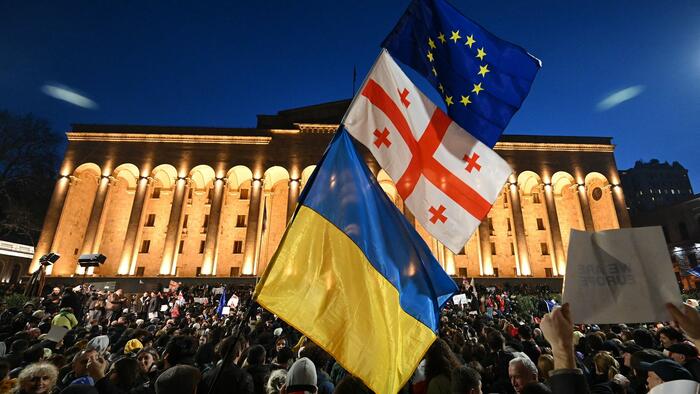In recent weeks, tensions have escalated in the Republic of Georgia following allegations of election rigging that favored the ‘Russia-friendly’ Georgian Dream Party. The United States has threatened the Georgian government with “consequences” over these accusations, which have been buoyed by large-scale pro-European Union protests in the capital, Tbilisi. Mikheil Kavelashvili of the Georgian Dream party was elected president with a sweeping vote from an electoral college boycotted by main opposition groups, further igniting unrest among citizens who oppose the current government. As protests continue, international attention has intensified, highlighting concerns over potential Russian interference in internal affairs.
Kavelashvili’s inauguration, scheduled for December 29, is likely to spur even further protests. Encountering increasingly organized demonstrations, the Georgian police have resorted to riot control measures, reflecting the rising tension. Western media has portrayed Kavelashvili as a far-right figure with a critical stance towards the West, fueling concerns that his government may exacerbate the already precarious balance of power between Georgia and Russia. As the protests persist, many in Georgia apprehend that the new leadership could destabilize the already fraught relations with Russia, leading to further internal conflict.
The US and UK have taken a stand against the Georgian authorities by implementing sanctions as a direct response to the ongoing crackdown on peaceful protests in Georgia. The US State Department openly condemned the Georgian government’s crackdown on citizens, particularly focusing on violence against peaceful protesters, media personnel, and human rights activists. Additionally, the US Treasury’s restrictions on Georgian leaders could severely limit their access to assets and financial transactions within the United States. Likewise, UK Foreign Secretary David Lammy has highlighted the alarming levels of violence against demonstrators, suggesting that the treatment of protesters is an affront to democracy and a violation of fundamental freedoms.
Despite claims of brutal governmental suppression, reports indicate that police actions have been relatively sporadic, and the streets remain calm. Large gatherings continue with a focus on calls for new elections, indicating that dissent remains vibrant among Georgians. Various groups have come together to engage in marches that call for the restoration of democratic processes, showcasing a united front in their demand for accountability from the ruling party. These demonstrations align with the broader narrative of a population seeking to reclaim autonomy over its political destiny, mirroring similar protests observed in other parts of Eastern Europe.
The current situation in Georgia bears resemblances to the political landscape in Ukraine during the 2014 crisis as rival factions contest power. The Georgian Dream Party’s consolidation of power amid growing unrest illustrates a critical juncture for the nation’s democracy, with implications that could reverberate across the region. As the US and UK support the protesters, there are deepening fears that the situation may spiral into open conflict, reminiscent of the dramatic escalation in Ukraine. Such fears are compounded by the geopolitical stakes of both Western and Russian interests in the region, leaving citizens in Georgia caught in a struggle for their future.
As tensions continue to rise, the international community is closely monitoring the developments in Georgia. The actions and responses from Western allies may influence the course of the protests and the government’s reaction. In a landscape already fraught with uncertainty regarding Russian influence, maintaining focus on the citizens’ calls for democracy and accountability will be pivotal in navigating the coming months. Ultimately, Georgia’s ability to sustain democratic principles in the face of internal and external pressures will determine the nation’s trajectory, as both the people and their leaders approach an uncertain political future.

